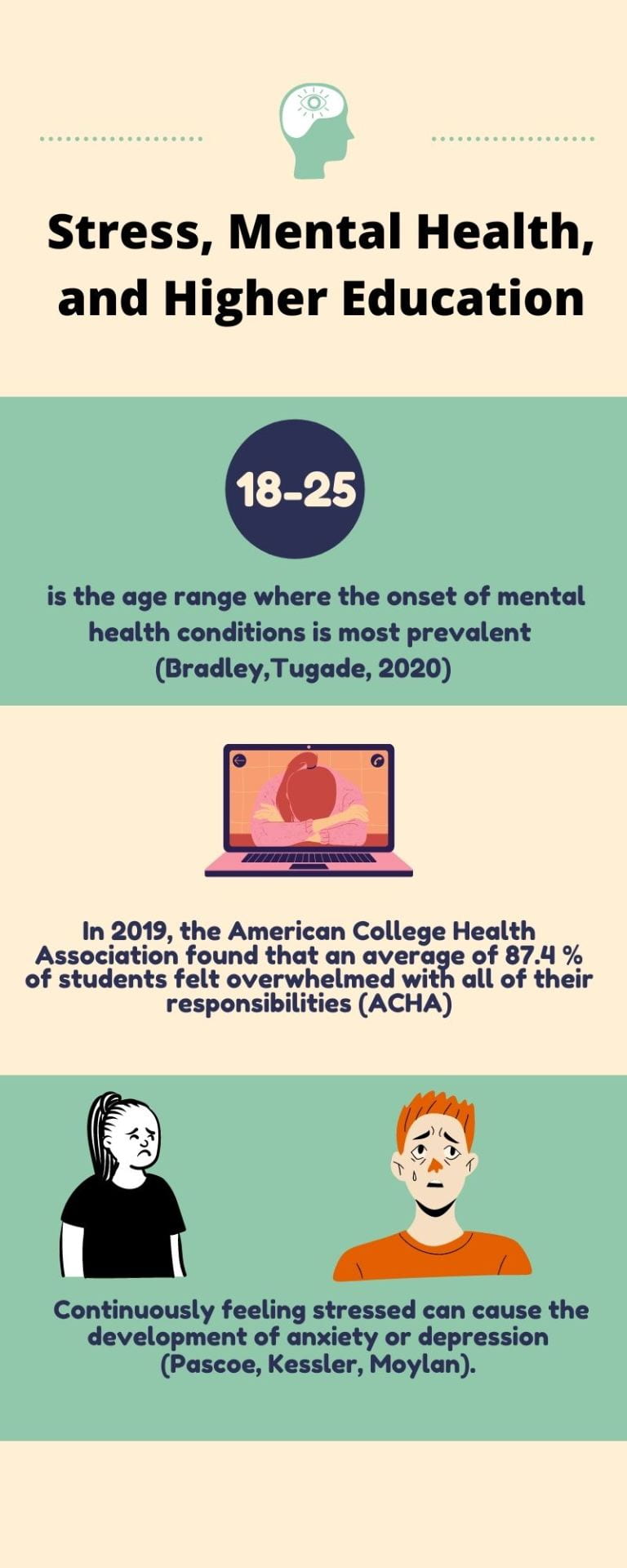It’s no secret that college students often feel stressed. It’s not easy to balance academic success, self-care, maintaining a social life, and work. While most students are bound to feel some stress, feeling stressed all or most of the time can have long term effects.

When someone is already feeling stressed, or when being stressed is normalized, it can be difficult to reach out for help. Going to a weekly therapy session just feels like another item on the to-do list, adding more time for self-care seems impossible, and some may find it more stressful to be open about their experiences with another person. In these instances, it is important to view mental/emotional stress like we do physical stress. If someone sprains their ankle, chooses not to rest or go to the doctor, and running and lifting heavy things, and doesn’t tell anyone their ankle hurts then the injury is only going to get worse. That is why early intervention is so important for those experiencing a decrease in their mental and emotional wellbeing- without intervention it will only get worse.
Mental Health First Aid describes early intervention as “recognizing the warning signs of a mental health or substance use challenge and acting before it gets worse” (Mental Health First Aid, 2021). There are a number of ways students can make their mental wellbeing a priority before the effects of stress cause a deep impact on their lives.
- Start counseling early in the quarter: The first couple weeks of classes can feel manageable. There won’t be a lot of assignments, there’s usually plenty of time to spend with loved ones, and the stress of midterms or finals has yet to happen. While some may feel like it is premature to meet with a mental health professional when they don’t feel overwhelmed with their emotions, starting regular sessions at the early signs of stress may decrease the chances of someone becoming overwhelmed in the first place.
- Plan for self-care daily: It can be easy to feel like there isn’t enough time for self-care, especially when we are feeling stressed. However, this is the most important time to increase our engagement with self-care practices. And the activities should relate to the needs that aren’t being met due to the increase of stress. For example, if someone is feeling disconnected from friends because of all the time that needs to be spent on schoolwork, they might schedule 20–30-minute hangouts. This can help maintain social connections and act as healthy break from studying.
- Schedule regular check-ins with a peer or professor: Some people may not want to meet with a mental health professional for a number of valid reasons. In this case, having a trusted person in their life who can see them or talk to them regularly, point out when it seems their stress level is increasing, and offer support that is appropriate for both parties might be a better option. If the support is coming from another student, the individuals can even be supports for each other. It is often easier to be open about difficult experiences with someone we feel understands our experiences.
- Reassess Time Commitments: When every minute of every day is planned out, individuals can feel too busy to stop and recognize that having too many responsibilities is causing stress, anxiety, or depression. It is important to have a well-rounded schedule that includes time for academic success, social activities, and personal wellness. We can only give as much to others as we are giving to ourselves, and it is better to step away from a couple of responsibilities than to get burned out and need a long break from most or all of our previously planned commitments.
Checking in with ourselves and honoring our emotions is not always an easy task. But hopefully by having a support system who is open about their mental health and is understanding when we need to take more time for ourselves, and knowing our own limits, we can be better prepared for when stress does show up in our lives.
Related Articles:
https://www.tandfonline.com/doi/full/10.1080/02673843.2019.1596823